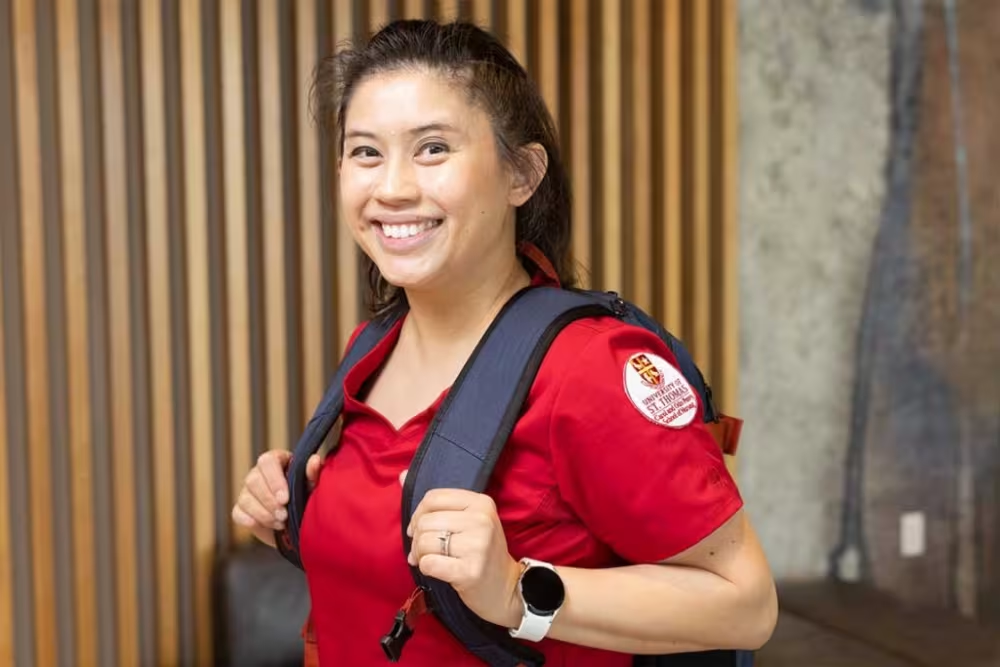What Nursing School Questions Should You Ask Admissions Advisors?
Each blog post is dated and contains accurate information as of that date. Certain information may have changed since the blog post publication date. If you would like to confirm the current accuracy of blog information, please visit our ABSN overview page or contact admissions at (855) 830-2713.
Author Bio: Founded in 1947, The University of St. Thomas has helped many aspiring nurses on their path toward a successful career in nursing through its Accelerated Nursing Program in Houston, Texas.
If you’re wondering what to look for in a nursing program, utilize these recommended nursing school questions to ask admissions advisors. They involve the admissions requirements and prerequisites, start dates and program formats, accreditation, financial aid, student support resources, and more.

You might be interested in entering healthcare to become a nurse, but you likely have nursing school questions. Here are some questions to ask nursing school admissions advisors:
- Is the program accredited?
- How long is the program?
- What are the nursing school admissions requirements or prerequisites?
- Do I need prior healthcare experience?
- Is the program in person, online, or both?
- What support does the program offer?
Admissions advisors at the University of St. Thomas Houston’s Accelerated Bachelor of Science in Nursing (ABSN) program are always happy to answer your nursing school questions. With UST’s ABSN, you can graduate in as few as 12 months using an online and in-person hybrid model.
To help you get the ball rolling, here is a list of the top 10 questions to ask nursing school admissions staff with answers. Think about what you want in a nursing program and use that information to expand upon the list of questions below.
1. Nursing School Questions About Accreditation and State Approval
One of the first things you’ll want to ask about is the school’s accreditation and state approval status. You can rest assured that you’ll gain a quality nursing education from the ABSN program at UST because it checks both boxes.

The University of St. Thomas is accredited by the Southern Association of Colleges and Schools Commission on Colleges (SACSCOC) to award baccalaureate, master’s, and doctoral degrees. On a national level, the baccalaureate degree program in nursing at UST is accredited by the Commission on Collegiate Nursing Education (CCNE). Furthermore, UST’s ABSN program has state approval from the Texas Board of Nursing.
Why does accreditation matter so much when choosing a nursing school? Accreditation by a national body, such as CCNE, helps ensure that a nursing program provides a quality education that meets national nursing standards.
From a career growth perspective, you’ll stand a better chance at landing a nursing job with a degree from an accredited and state-approved institution. Employers typically prefer to hire nurses who graduated from an accredited nursing program, and many graduate-level nursing programs do not accept credits from non-accredited nursing programs. If you plan to advance your nursing education, you’ll likely need a degree from an accredited school.
2. Are Prerequisite Courses Required?
If you were a recent high school graduate about to go to college for the first time, you wouldn’t need to complete college-level prerequisites. However, to facilitate the transition from a non-nursing background to nursing school, ABSN applicants often need to complete these preparatory classes to prepare for the intensive nursing school curriculum.
The ABSN program at UST doesn’t require as many prerequisites as many other accelerated nursing programs. Depending on your academic background, you might not need to complete any prerequisites or perhaps only one. Your dedicated admissions advisor will review your transcripts to determine what you’ll need to apply.

Need a little more info about prerequisites? Learn all about the prerequisites for nursing school.
3. Questions to Ask About Nursing School Admissions Requirements
You can likely find ABSN requirements on each program’s website, but asking your nursing school admissions advisor about specific requirements is beneficial. Your advisor can help you plan to complete any lingering admissions requirements you may be missing before the application deadline for your target start date.
Your admissions advisor can identify if you’re an ideal candidate for the program and help you stay on track with completing prerequisite courses. Once you meet the program’s admissions requirements, your advisor will assist with forms or documentation you may need to submit with your application.

In addition to 60 college credits or a non-nursing bachelor’s degree from an accredited university or college, to qualify for enrollment in UST’s ABSN program, you must:
- Complete the prerequisites for the program before enrollment.
- Have a cumulative GPA of 3.0 or higher (including a 3.0 GPA for all prerequisite science courses).
- Earn a score of 80 or higher on the Health Education Systems, Inc. (HESI) Admission Assessment exam (required 80% in each of the following sections: Reading Comprehension, Grammar, Vocabulary, Math, and Anatomy & Physiology)
- Students may also gain admittance with a passing score of 78% on all sections of the Test of Essential Academic Skills (TEAS) exam.
4. Will I Be Able to Succeed Without Any Prior Nursing Experience?
The ABSN program at UST is designed to help those with either 60 college credits or an existing non-nursing bachelor’s degree enter the field on an accelerated timeline. You can apply to our hybrid online program regardless of your academic background. Although those with bachelor’s degrees in a scientific discipline may have an easier time adjusting to the rigors of accelerated nursing school, students from all academic backgrounds can succeed.
You can expect to take classes that build on the fundamentals of sciences during the early semesters of the curriculum, but if you’ve never taken those classes before, don’t fret. All students accepted into the ABSN program at UST must take the same prerequisite courses, so you’ll start on a similar academic footing as classmates with a science background.
5. What Student Support Resources Are Available?
Accelerated BSN programs, such as UST’s, are geared toward adult learners with the ambition and motivation to further their education and become nurses. If you want to pursue a BSN, internal drive and dedication are valuable traits, but nursing is a notoriously challenging field of study. Finding a program that offers support resources can ease your transition and help you regain your footing.

When talking with your admissions advisor, it’s essential to ask about the program’s student assistance options. For example, the ABSN at UST makes it clear that student achievement is its top priority, starting with your initial inquiry into the program. Your advisor is there to help you devise a personalized academic plan that sets you up to graduate on the best timeline.
The support doesn’t stop there. Once admitted, our expert nursing faculty and clinical instructors make themselves available online, over the phone, and in person if you’re ever struggling with a course concept or a specific nursing situation. Our Academic Success Coaches can also point you in the right direction for additional study resources or offer strategies for finding a healthy school-life balance.
UST goes the extra mile to facilitate our students’ accomplishments. Learn more about seven nursing student resources available at UST.

6. How Soon Can I Start the Program?
The answer to this nursing school question depends mainly on your academic background and motivation to pass any prerequisites and entrance exams. If you majored in a scientific discipline, you may not need to take as many prerequisites as someone with a Bachelor of Arts in Marketing, for example.
Keep in mind that prerequisites are available through the University of St. Thomas; your admissions advisor can work with you to enroll in those courses, develop strategies to boost your GPA if it’s just below the minimum requirement and keep you on track to pass them on a timeline that aligns with your target start date.
Once you complete the prerequisites and pass the HESI or TEAS exam, you can choose from one of three start dates per year — January, May, or August.
7. Is Coursework Available Online?
Some questions to ask nursing school admissions staff pertain to the program’s format. In some cases, you can work through a hybrid format. With the ABSN at UST, for example, you can take online coursework for greater convenience and flexibility. Plus, the online classes offer the opportunity to rewatch lectures when you need to and complete interactive learning activities.

The online classes are paired with in-person activities, such as hands-on nursing-skills labs and clinical rotations. These in-person components allow you to build and refine essential nursing practices.
8. Which Nursing Specialties Are Available for Clinicals?
One of the most attractive perks of becoming a registered nurse (RN) is the ability to choose from a wide range of nursing specialties. For example, you could specialize in anything from hospice care to dialysis.
You’ll gain exposure to some of these nursing specialties when you begin clinical rotations at nearby healthcare facilities. At UST, you may complete clinicals that focus on:
- Adult Health
- Community Health
- Mental Health
- Obstetrics
- Pediatrics
Completing a diverse range of rotations can help you determine which specialty you want to pursue as an RN.

Check out this blog to learn what to expect in nursing clinicals.
9. Is It Possible to Work as a Nursing Student?
Another question you may want to ask is whether nursing students are typically able to work while completing the program. Nursing school is an investment in your future. While working as a student can help defray some costs, it’s best not to try to work while tackling an accelerated nursing program, such as the ABSN at UST.
Accelerated programs get their name for a reason; they are fast-paced, and students should expect to commit full-time to their studies. Working a few hours here and there may be possible if you absolutely must, but try to avoid doing so. You’ll need to prioritize your studies to graduate on time.
10. Is a Financial Aid Advisor Available to Help Me?
Instead of working through nursing school, it is best to take advantage of any financial aid offers. You should ask your admissions advisor if the school provides financial aid advisors to assist students with navigating the economic aspects of returning to school. At UST, we strongly recommend that prospective ABSN students contact our Financial Aid Office as soon as possible to get personalized assistance.

Although every student’s situation is unique, it’s generally a good idea to:
- Fill out the Free Application for Federal Student Aid (FAFSA) to see if you qualify for federal grants and loans.
- Search for private scholarships for undergraduate students and apply to as many as you can.
- Consider whether you can or should tap into your savings.
- Consider whether to apply for private student loans and research which financial institutions offer the best rates and terms.
Take the First Step Toward Nursing School Today!
Knowing the right questions to ask about nursing school is vital for making an informed decision on choosing the best nursing program for you. Although it’s helpful to have a list of nursing school questions available before you make that first phone call, the admissions advisors at UST are always here if any follow-up questions occur to you later.
Contact us today to learn more about how you can start your nursing journey.
